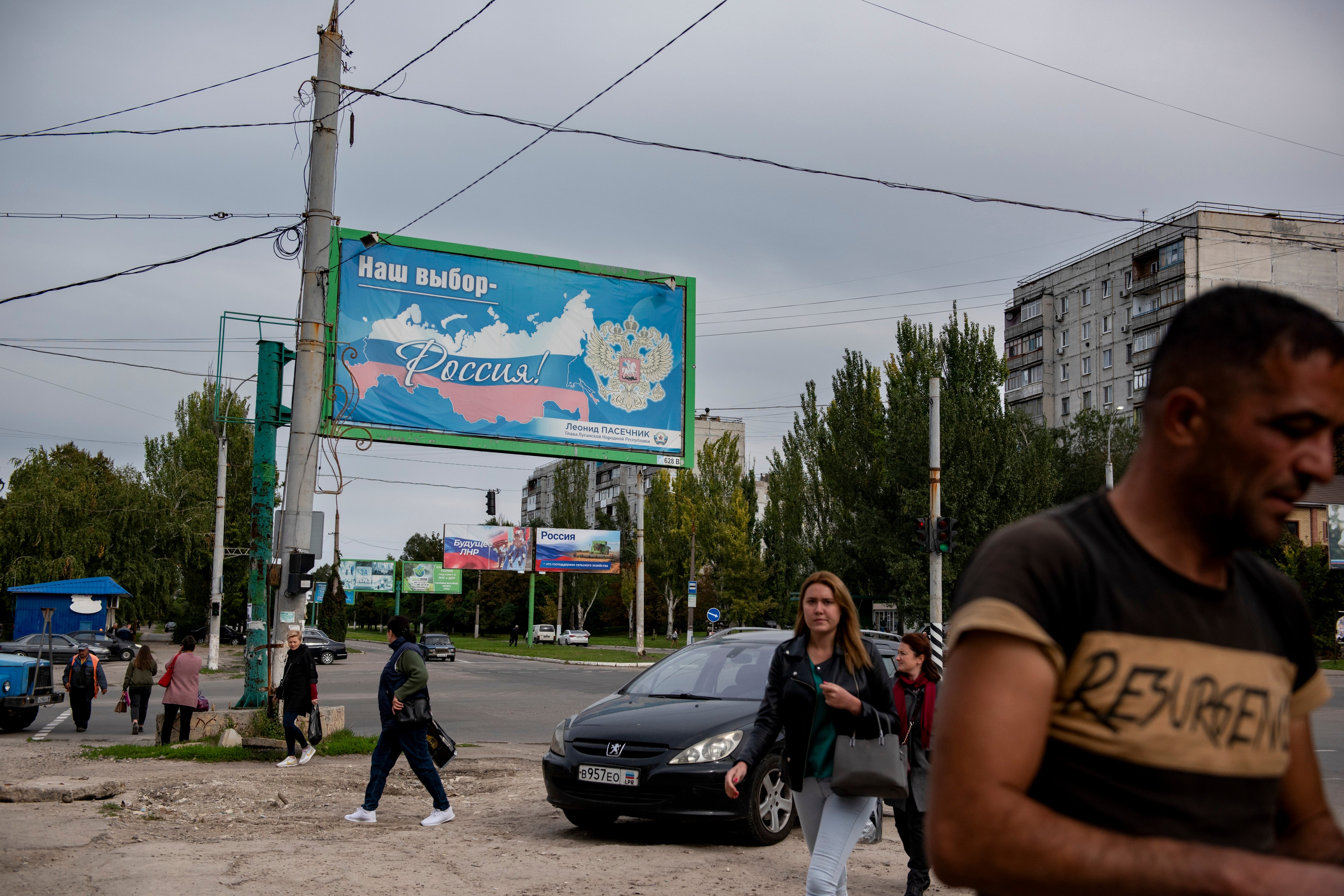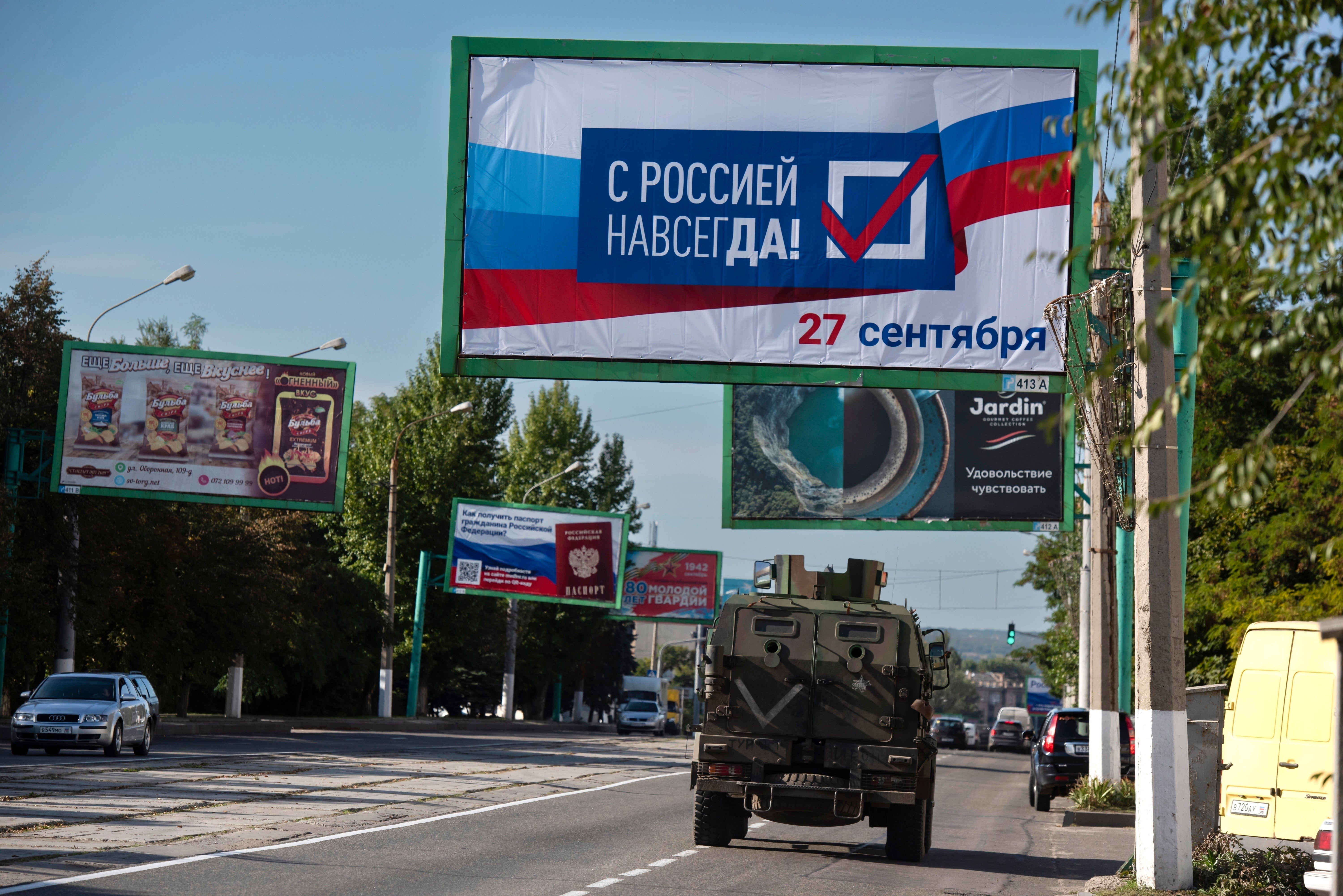First results from ‘sham’ Ukraine referendums show 96% want to join Russia
Russia warned it could resort to nuclear weapons to defend what it claimed as its own territory, including newly acquired lands
The first results from four occupied regions of Ukraine showed majorities of more than 96 per cent of people voting in favour of becoming part of Russia in referendums denounced by Kyiv and the West as a sham.
The state-owned Russian news agency RIA said the initial counts showed majorities ranging from 96.97 per cent in the Kherson region, based on 14 per cent of votes counted, to 98.19 per cent in Zaporizhzhia, based on 18 per cent of the count.
In the so-called Donetsk and Luhansk people’s republics, the majorities pushed 98 per cent with a similar number of votes counted.
The figures came as speculation mounted that Vladimir Putin is expected to announce annexation of territories later this week. Voting finishes on Tuesday.
The Ministry of Defence (MoD) said on Tuesday that Putin is likely to announce the accession of the occupied regions of Ukraine to the Russian Federation during his address to parliament on 30 September.
Kyiv and the West have dismissed the referendums as a sham and pledged not to recognise the results while Ukrainian president Volodymyr Zelensky said the Donetsk region in the east remained his country’s.
“Russia’s leaders almost certainly hope that any accession announcement will be seen as a vindication of the special military operation and will consolidate patriotic support for the conflict”, the MoD bulletin said.
Russia warned it could resort to nuclear weapons to defend what it claimed as its own territory, including newly acquired lands.
After the balloting, “the situation will radically change from the legal viewpoint, from the point of view of international law, with all the corresponding consequences for protection of those areas and ensuring their security”, Kremlin spokesman Dmitry Peskov said.
President Vladimir Putin has talked up Moscow’s nuclear option since last week after a Ukrainian counteroffensive led to battlefield setbacks and has the Kremlin’s forces increasingly cornered.
The balloting that started on Friday in the Kherson, Zaporizhzhia, Luhansk and Donetsk regions and a call-up of Russian military reservists ordered by Mr Putin are other strategies aimed at buttressing Moscow’s exposed position.
Dmitry Medvedev, the deputy head of the Russian Security Council chaired by Mr Putin, spelled out the threat in a fresh nuclear threat on Tuesday.
“Let’s imagine that Russia is forced to use the most powerful weapon against the Ukrainian regime that has committed a large-scale act of aggression, which is dangerous for the very existence of our state,” he wrote on his messaging app channel.

Tens of thousands of residents had already fled the regions amid the war, and images shared by those who remained showed armed Russian troops going door to door to pressure Ukrainians into voting.
Mariupol mayor Vadym Boychenko, who left the port city after the Russians finally seized it following a months-long siege, said only about 20 per cent of the 100,000 estimated remaining residents cast ballots in the Donetsk referendum. Mariupol had a pre-war population of 541,000.
“A man toting an assault rifle comes to your home and asks you to vote, so what can people do?” he said during a news conference.
French foreign minister Catherine Colonna said while visiting Kyiv on Tuesday that France was determined “to support Ukraine and its sovereignty and territorial integrity”.
Meanwhile, the mass call-up of Russians to active military duty has to some degree backfired on Mr Putin. It has triggered a massive exodus of men from the country, fuelled protests in many regions across Russia and sparked occasional acts of violence.

In response, Ukraine has urged the European Union on Tuesday to impose economic sanctions on Russia to punish it for staging annexation votes in four occupied regions, and said the moves by Moscow would not change Ukraine’s actions on the battlefield.
Foreign minister Dmytro Kuleba, after talks in Kyiv with Ms Colonna, said personal sanctions would not suffice as punishment for the referendums, billed by Russia as a prelude to it annexing four Ukrainian regions.
“It won’t be enough to limit oneself to cosmetic measures... the softer the reaction to the so-called referendums, the greater the motivation for Russia to escalate and annex further territories,” Mr Kuleba told reporters.
“In the content of the eighth (EU) sanctions package, we will see just how seriously the EU takes the problem of referendums.”
Join our commenting forum
Join thought-provoking conversations, follow other Independent readers and see their replies
Comments
Bookmark popover
Removed from bookmarks